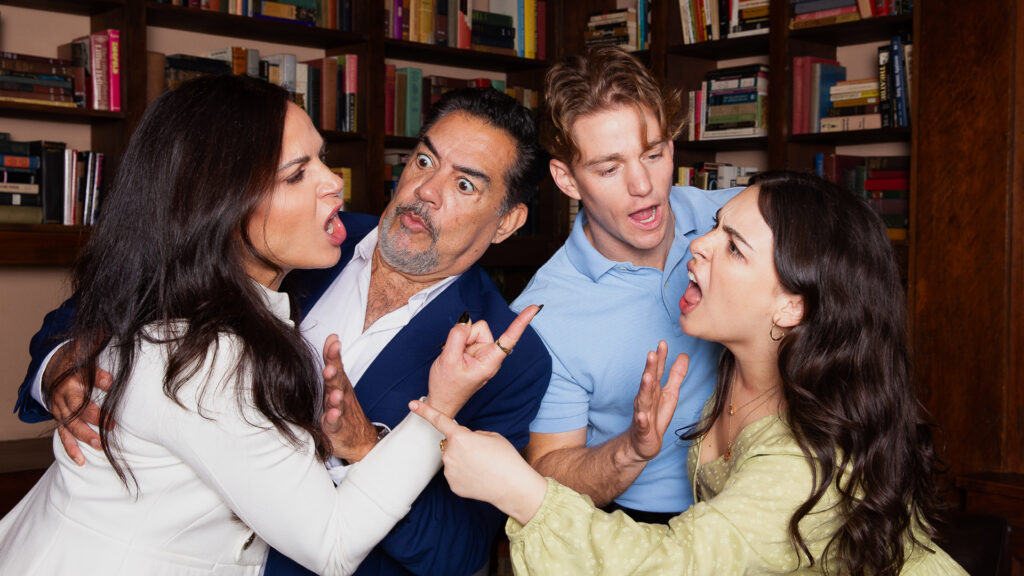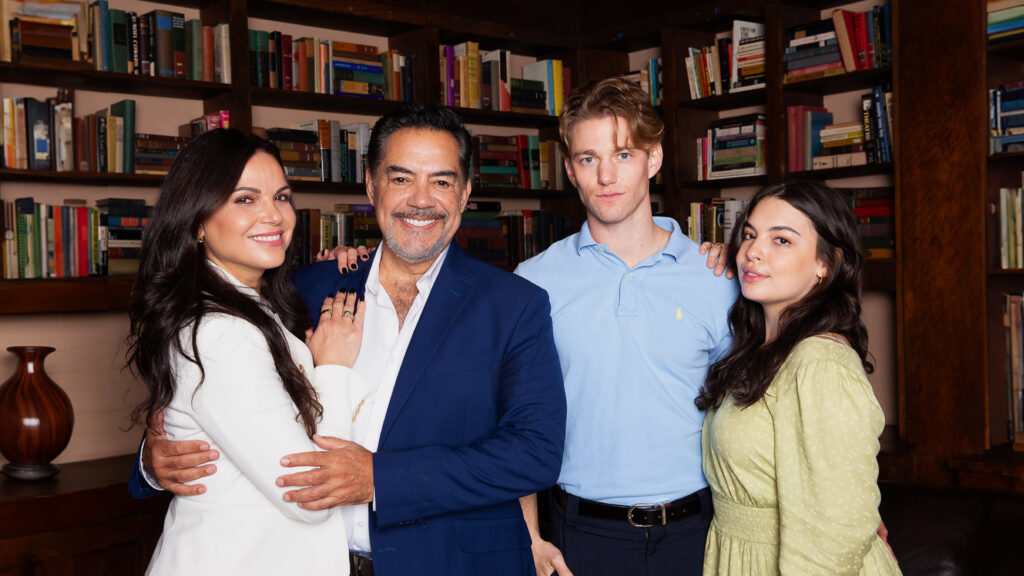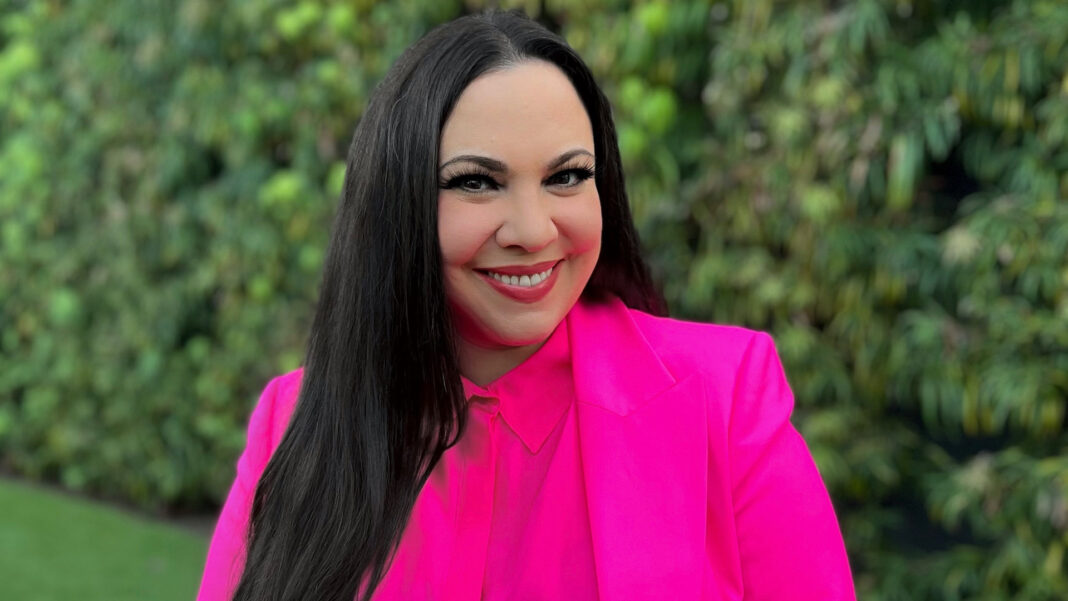“I think that all of us would really like to be having a better time here while we’re here. I’m so grateful that my brain goes to comedy, because I have found that a lot of times these messages, these pills, are better able to be swallowed with a little humor.” Humor is writer/producer/playwright Gloria Calderón Kellett’s bread and butter.
She was the producer/director and co-showrunner of One Day at a Time that starred Justina Machado and Rita Moreno. She’s also the woman behind the Amazon series With Love. But what many people don’t know about Calderón Kellett is that she is also a playwright. Her plays include Plane Strangers, In Her Shoes and Baggage and now One of the Good Ones.

One of the Good Ones is having its world premiere at the Pasadena Playhouse where it will play through April 7th. Calderón Kellett takes the classic idea of the daughter bringing home a man and her parents don’t know what to think of him. Yoli (Isabella Gomez – also from One Day at a Time) is the perfect Latina daughter. But is Marcos (Nico Greetham) good enough for her or her parents (Ilana and Enrique played by Lana Parrilla and Carlos Gomez)? Can anyone be good enough for her? The issue here, told as only Calderón Kellet can, is not about his ethnicity. It is about how each of the five characters in the play define themselves and what it means for each of them to be an American. It’s not always the same thing. Or is it?
There are multiple surprises that await theatergoers. But Calderón Kellett says one of them is the very setting of her play.
“Part of this play was also intentionally set in Pasadena with a wealthy family because we never get that,” she revealed. “That certainly exists all over the city. There’s a lot of Latinos that have money, that have generational wealth. What does that look like? Those stories deserve to be told as well. So it was all very intentional. There will be people in the audience that do not know that Pasadena was Mexico.”
That’s just one example of the fascinating conversation I had with Calderón Kellett as One of the Good Ones was in the final weeks of rehearsals. What follows are excerpts from our conversation that have been edited for length and clarity.
Q: In a 2021 interview that you gave to latina.com you said, “I feel really fortunate that my brain defaults to comedy in dark moments.” What was your initial inspiration for One of the Good Ones? Did it come out of a dark moment and when did you start writing it?
It did come out of a dark moment. A dark and a light moment. When I did One Day at a Time, which was more based on my life and experience, people suddenly really wanted to talk to me about being Latina – which I’m happy to talk about. I love being Latina, but it was very interesting that the panels and the discussions would be either about being female or about being Latina, and very little about being a writer or a showrunner. I was happy to take that. To sort of take that bullet initially because it felt like we’re in a time where that’s still so rare that I’m going to talk about it. But also, how weird that it’s so rare that we have to talk about it.
I had to talk about Latinidad so much. Trying to make people understand we are 19 plus countries under this umbrella of Latin. That in the United States Latino, as a term, is supposed to encompass all of us. It can’t possibly, because we all come from different backgrounds and different places. So it felt like it would be interesting to talk about identity in a comedic manner, and how could I do that? I love the challenge. I love writing myself into corners. I love the challenge of 90 minutes, no intermission.
In that same interview you talk about having three generations when you grew up and you were the kid for so long. Then you’d transitioned into your parents and were in the middle. “It’s a sandwich and I’m the meat in between my children and my parents and I’m trying to navigate that.” How much is One of the Good Ones your response to that place you find yourself today?
Absolutely. I see myself always in the female characters in such a strong way. And then the male characters really reflect so many of the males [in my life]. Enrique’s very my father. My husband has said, I like when your dad’s here because a man’s in the room. That’s the kind of man my dad is. He’s like an old school man. There are things about that that are so comforting. And my mom is sort of this old school mom. She’s always beautiful: always a heel, always a lip. I don’t know that I’ve ever seen my mom without that lipstick.
I also feel a lot of the Yoli of it. I was the first one to go to college. When I came back I was wanting to have these conversations. They were both so excited to have me go off to college and be the first to go to college, and then somewhat threatened by these new conversations and thoughts that I was bringing in the house. I really want to poke the bear and talk about the things. We see obviously the guest who’s coming to dinner. We’re all familiar with a Black man coming into this home and the conversations that arise [Guess Who’s Coming to Dinner?]. When I brought my husband home, who’s a lovely white guy, my family was very warm, but I do feel like they were disappointed I didn’t bring a Cuban guy home.
Yoli says early in the play, “We can’t put off conversations because they might be unpleasant.” What are you hoping the conversations will be, pleasant or unpleasant, after people get a chance to see your play?
I hope they’ll first say, that was so fun and funny. Then it’ll be like, wow, there’s a lot there I hadn’t thought about. Some of my favorite thoughts of the play are surrounding the melting pot idea. I’ve really, I think, benefited from walking so deeply in the history of my ancestors. It gives me such purpose. I think that so often people think America is cool, but it has no culture because it melts away. So these are the conversations I want people to have. If people are able to walk away talking about their own identity as well as understanding a little portion of this Latino family’s journey, I think that would be really cool.
At another point Yoli responds to something said to her by saying it is filled with the kind of dialog that sort of smacks of everybody respecting every possible thing, which, of course, the characters can’t sustain through the entire play. What is your personal view of how far one should go in order to be respectful of every aspect of one’s identity?
I think more than being PC, I think we need to be kind. If somebody is trying we give them the grace of knowing that they’re trying. They might not be perfect, but perfect is the enemy of good. If we’re trying to be kind and if we have genuine questions…I was in a room during One Day at a Time where half the room was queer. I am a straight lady. Before everything I’d be like, I’m so sorry. I’m probably going to say this wrong, but I have a question and I’d say the question. And they were like, no, it’s okay. That’s great that you ask that. Let’s get into it, because they know that I’m trying. We need to try.
I love the fact that Marco’s parents are named Marty and Elayne. As somebody who lived in LA my whole life, is that a nod to the entertainers that once frequented the Dresden Room?
It is. I’m so glad you caught that.
The lack of Latino Hispanic representation is only getting tougher right now, not easier, because all we’re seeing about people from Mexico, Central America and South America is the immigrant crisis on the border. Has that crisis created a reluctance in the entertainment industry, from your point of view, to support stories about people who come from these places?
100%. We have been seeing that for a long time. That’s my work. I talk about the immigrant experience, but you would be shocked by the amount of drug narratives, border-crossing narratives, cartel narratives that I turn down every single year. It always hurts my heart because once you point that out to people, their brains kind of explode. What stories of ours do they give the most money to? Griselda! I don’t think that they have the wherewithal to know how damaging it is for us. But man, I would have killed for part of Griselda‘s marketing budget for my little show about a family that loves their queer son when he’s getting married. It makes me so sad to know that Narcos narratives are the ones that still get the most money and the most marketing.
They are resistant to buy just a normal American family living their life. I was so fortunate that we got to make four seasons of One Day at a Time. I’m so grateful because, true to Norman’s [Lear] incredible work, that ended up being a time capsule of what it was like to live as a Latino in America during the Trump administration. I think a lot about the damaging narratives that we’ve seen. I also worry that that’s the only way they see us.

Yoli says in the play, “Mexicans come in all colors.” Apropos of our conversation about the industry, is there this belief that Mexicans are all one thing?
Yes. I think that people think that Mexicans are just what they see on these border crossing stories. I mean, Mexico City is very white. There’s also a ton of Afro-Latinos. Afro-Latinos are an enormous part of this American population and they get lumped in with Black most of the time because they’re not allowed to be the totality of their ancestry. That was an important thing that I did on With Love. I purposefully cast an Afro-Latino family and that was the first time either of those actors had played the totality of being Cuban and being Black. We’re Black. We’re white. We’re indigenous. We look like all of these things because of colonization and what that colonization brought. It’s important to let people know that there are blond Mexicans, there are Black Mexicans and everything in between.
So many people know you from television, but don’t know your other plays. What can people learn about who you are as an artist and who you are as a person, not just from One of the Good Ones, but from Plane Strangers, In Her Shoes or Baggage?
They’re all explorations of humans. I think what you can learn about me is that I’m a person that is also trying to figure it out. I am the proud daughter of immigrants. It’s always the first thing I say because I think it largely defines who I am and what my purpose is, which is to understand people who were in an oppressive regime and what they would do. My grandmother was my age and my daughter was the age of my mother when she sent her to the US in the hopes that people on the other side of the water would be kind. And they were. The promise of this country is that here you can be free to say what you want. So the sacrifice of my grandparents, to get my parents here so that I could speak freely. To try to hold up a mirror to society, with humor, heart and good intention, and lead conversations that can be healing and that can make the world a little bit brighter and kinder. That is my goal as an artist. I really try to do that with great intention when I’m making anything that I do, whether it’s a sitcom or a play.
Rita Moreno, one of the stars of One Day a Time, is quoted as having said, “I really started to understand that everyone has a responsibility to others and to a community, that you were not the only person in the world you simply represent, whether you like it or not.” I’m going to go out on a limb and assume you agree with her. But what is the responsibility you feel, and what would you like to do most with that responsibility moving forward?
I think the responsibility for me is to try to send the elevator back down. To hopefully blaze this trail so that it is open for others to come through it. I think that storytelling has become a little stale. I mean, the city is on fire right now. Not in a good way because of the need for commerce versus storytelling like authentic storytelling we’re chasing. I think that the people in power are chasing the high of money versus the impact that stories can actually have on community.
The divide of the country can directly be lined up to how we are not watching the same things anymore. There used to be shows that all of us would watch. There would be a commonality in a conversation that we could have with people of different economic, socio-economic backgrounds and ethnicities because all of us were watching Friends or something that brought us all together. Those days are gone. It has replaced it with echo chambers where people are just yelling to each other. I don’t know that that’s moving us in the right direction. So using entertainment, as a mirror to society, as a way to bridge, to foster conversation, is something I do feel very morally and ethically responsible in trying to provide. That’s what I’m going to keep on doing while I’ve got breath in this body.
Main Photo: Gloria Calderón Kellett (Photo by Abby Guerra/Courtesy Pasadena Playhouse)











